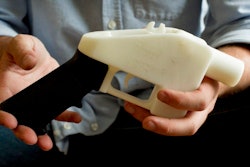TRENTON, N.J. (AP) — Gov. Chris Christie on Wednesday rejected legislation to increase the sales of smart guns, saying the measure would make the state "inhospitable" to legal gun ownership.
Christie, a Republican, conditionally vetoed the measure that would have required state gun retailers to keep an inventory of smart guns, which can be fired only by authorized users. He sharply criticized the Democrat-led Legislature, which sent him the bill for the second time this year in June. He had previously pocket-vetoed the measure.
"This bill is reflective of the relentless campaign by the Democratic legislature to make New Jersey as inhospitable as possible to lawful gun ownership and sales, and I refuse to allow that to happen," Christie said.
Democrats said Christie's veto amounted to an attempt to "pander" to out-of-state pro-gun groups.
"The Governor's conditional veto is proof that he is out of touch with the overriding sentiments of New Jersey residents, the majority of whom support gun safety," Assembly Majority Leader Louis Greenwald said in a statement.
The legislation would have required New Jersey gun retailers to keep an inventory of the weapons and would have amended a 2002 law regarding smart guns.
The 2002 law mandates that retailers begin selling only smart, or personalized, handguns within three years of them being available anywhere in the country, but the law has never gone into effect because no guns have been classified as meeting the criteria necessary for the requirement.
Lawmakers say the existing law had the unintended consequence of delaying the sale of personalized handguns because opponents pressured gun retailers in other states not to sell the weapons.
Gun rights activists worried that actions to market smart guns in Maryland and California in 2014 could have activated the law in New Jersey. They argued that the vetoed legislation amounted to an attempt to compel the market to accept "dangerous and unreliable technology."
The company Armatix markets a .22-caliber handgun that can only be fired if it's within range of a unique wristwatch, but New Jersey's Christie-appointed attorney general determined in 2014 that the weapon does not meet the state's definition of a personalized handgun.
Christie also conditionally vetoed another bill requiring residents to show a "justifiable need" to obtain a firearm permit. Christie instead called for lawmakers to make it easier for residents to obtain a permit.
Under current law, residents seeking a handgun permit must apply to their local police chief and a Superior Court judge and show a "justifiable need," defined under regulations as the urgent need for self-protection, to obtain the weapon. The legislation would have made the stricter definition state law.
Christie, who earlier announced regulatory changes to make it easier for resident to get guns, criticized the proposal and said the "justifiable need" standard has made it "nearly impossible" for residents to obtain a concealed carry permit.






















